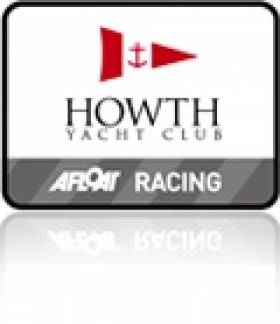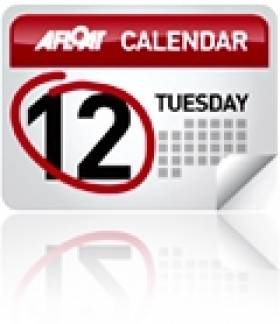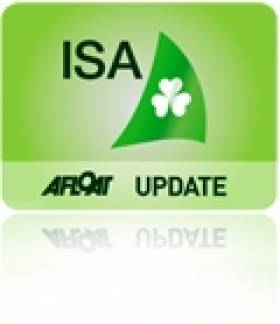Displaying items by tag: ISA
Junior Race Training in HYC on J80s
Sixty-four of Howth Yacht Club's junior sailors were treated to an evening of race training in the ISA Sailfleet J80s on a fresh Monday evening, under the guidance of Laura Dillon.
A host of support vessels and RIBs facilitated the running of the evening which saw all the children (ranging in age from 9 to 15) taking part in two short windward-leeward 'races' with two senior volunteers on each of the eight J80s.
The moderate southerly wind facilitated exciting conditions in the flat waters of Howth Sound and gave many of the children their first taste of one-design keelboat racing. More than thirty-five volunteers escorted the exhilarated sailors back to the club after their experience.
Spiddal Open Day this Sunday
The club is recognised by the ISA, and runs ISA-approved youth training courses for its members every year, ranging from an introduction to sailing to more advanced techniques. Its course programme this year runs from 28 June to 9 July.
Weather permitting, there will be opportunities to try your hand at crewing or helming in Spiddal harbour from 2.30pm to 4.30pm.
Last day for Development Officer applications
Today is the last day for applications for the Irish Sailing Association development officer post, to be based in its Dun Laoghaire offices. The role involves supporting clubs and teaching establishments in growing their activities and membership and promoting the ISA's training agenda nationwide.
Details are here.
Irish Sailing Association (ISA)
The ISA is national governing body for all forms of recreational and competitive activities involving sail and engine powered craft in Ireland.
CLICK FOR THE LATEST IRISH SAILING ASSOCIATION NEWS
At the recent UIM (Union Internationale Motonautique) general assembly, the ISA was formally (and unanimously) approved as the recognised UIM member governing powerboat racing in Southern Ireland.
This is another step towards developing our commitment to promote motor boating activities in Ireland.
The ISA constantly monitors and reviews developments in sailing and boating and represents the interests of its members and other sailing and boating enthusiasts with government and international agencies.
The ISA has initiated the process of developing our third strategic plan (2009–2013) so that they can work to improve our services for the benefit of all boaters and sailors in the future.
The ISA also develops and administers a range of training and other services to support both members and all those involved in sailing and boating of all types, which currently includes:
Dinghy sailing
Sail cruiser sailing
Motor cruiser sailing
Motor cruising (Inland Waterways)
Powerboating
Windsurfing
Personal watercraft
Irish Sailing Association, 3 Park Road, Dun Laoghaire, Co Dublin. Tel: 01 28 00 239, Fax: 01 2807 558, Email: [email protected]
National Organisations
National Organisations
There are a number of different organisations established in Ireland to manage the marine leisure sector and these stakeholders are an important part in the future growth of the sector that is arguably worth 700 million euro per annum to the Exchequer.
The main organisations – including some in the UK – are:
Cruising Association of Ireland – The Cruising Association of Ireland was set up with the aim of working with the Irish Sailing Association and the Royal Yachting Association Northern Ireland for the promotion and encouragement of cruising and of social union among its members.
Heritage Boat Association – The Heritage Boat Association’s aspiration is to protect, promote and celebrate the floating heritage on the inland waterways of Ireland.
Inland Waterways Association – A voluntary body formed in 1954 of inland waterways enthusiasts, the IWA advocates the use, maintenance, protection, restoration and improvement of the inland waterways of Ireland.
Irish Amateur Rowing Union/Rowing Ireland – The IARU/Rowing Ireland is the governing body for rowing in Ireland and represents over 100 clubs across Ireland. Rowing is one of Ireland's most successful sports, having won multiple World Championships over the last decade.
Irish Coast Guard (IRCG) (Garda Cósta na hÉireann) – The Irish Coast Guard is part of the Department of Transport. The Irish Search and Rescue Region, which includes most of the Republic of Ireland and parts of Northern Ireland, is the area over which the coast guard has authority. This area is bounded by the UK Search and Rescue Region.
Irish Cruiser Racer Association – ICRA can be contacted via Commodore Fintan Cairns at [email protected] or the Secretary Denis Kiely at [email protected]
Irish Disabled Sailing Association/Sailforce – Sailforce is a new campaign established by the Irish Disabled Sailing Association (IDSA) to highlight the achievements and activities of their current membership and to introduce members of the general public to the concept of sailing as a viable sport for the disabled.
Irish Marina Operators Association – The IMOA is an associate group of the Irish Marine Federation (IMF) focussing exclusively on the needs of marina operators. Membership of IMOA currently represents coastal marinas, but will eventually be open to Ireland's inland waterway marinas.
Irish Marine Federation – The IMF is the national organisation representing both commercial and leisure sectors of the marine industry in Ireland.
Irish Maritime Law Association – The Irish Maritime Law Association was formed at a meeting in the Shelbourne Hotel in Dublin on 23 May 1963.
Irish Rowing Union – The IARU is the governing body for rowing in Ireland and represents over 100 Clubs across Ireland. Rowing is one of Ireland’s most successful sports, having won multiple World Championships over the last decade.
Irish Sailing Association – The ISA is the national governing body for all forms of recreational and competitive activities involving sail and engine powered craft in Ireland.
Irish Sea Shipping – Online Shipping Magazine with shipping news and views from the Irish and Celtic Seas since 1995.
Irish Ships & Shipping – Irish Shipping Ltd. was set up in 1941 to ensure Ireland could import and export essential goods during World War II. Britain had decided that it could no longer put its ships and men at risk by supplying a country had had decided to remain neutral. So after a meeting held at Earlsfort Terrace, Dublin, on the 21st of March 1941, a National Shipping Company was formed called 'Irish Shipping Ltd.' .
Irish Underwater Council – The Irish Underwater Council is the national governing body for recreational underwater sports in Ireland. It was founded in 1963 to organise and promote sport scuba diving and snorkeling. At that time there were only six clubs but the sport has expanded over the years and today encompasses 84 clubs distributed all over Ireland.
Irish Water Safety – Irish Water Safety is the statutory body established to promote water safety in Ireland. Their role is to educate people in water safety best practices and develop public awareness campaigns to promote necessary attitudes, rescue skills and behaviour to prevent drownings and water-related accidents.
Marine Casualty Investigation Board – The function of the MCIB is to carry out investigations into marine casualties that take place in Irish waters or involve Irish registered vessels. The main purpose of the Board's investigations is to establish the cause or causes of a marine casualty with a view to making recommendations to the Minister for Transport for the avoidance of similar marine casualties. It shall not be the purpose of an investigation to attribute blame or fault.
Met Éireann: Irish Meteorological Service – Met Éireann, the Irish National Meteorological Service, is part of the Department of the Environment, Heritage and Local Government. It is the leading provider of weather information and related services for Ireland.
North West Charter Skippers Association – The North West Charter Skippers Organisation was inaugurated in January 2002, and was formed to enhance and develop Charter Boat Services through the interchange of Information through the promotion of a fleet of fully licensed, insured, and well-equipped Modern Sea Angling Vessels adopting best practice and providing a high quality service in Sea Angling and general tourism charters to the Northwest Coast of Ireland – 'Service with Safety'
Professional Association of Diving Instructors – PADI is the world’s leading scuba diving training organisation. With more than forty years experience and 5,300 dive shops and resorts worldwide, PADI training materials and services let you experience scuba diving from nearly anywhere.
RNLI Ireland – The RNLI is a registered charity that saves lives at sea. It provides a 24-hour lifeboat search and rescue service 100 nautical miles out from the coast of Ireland and the UK. The RNLI relies on voluntary contributions and legacies for its income.
Royal Yachting Association – The RYA is the national body in the UK for all forms of boating, including dinghy and yacht racing, motor and sail cruising, ribs and sports boats, powerboat racing, windsurfing, inland cruising and narrowboats, and personal watercraft.
Royal Yachting Association Northern Ireland – The RYA is the national body in the UK for all forms of boating, including dinghy and yacht racing, motor and sail cruising, RIBs and sportsboats, powerboat racing, windsurfing, inland cruising and narrowboats, and personal watercraft. The RYANI are their Northern Irish branch.
Union Internationale Motonautique/International Powerboat Racing Club – The UIM is the international governing body of power boating and is recognized as such by the International Olympic Committee. It is also a member of the General Association of International Sports Federations, and the Association of the IOC Recognized International Sports Federations. The sport governs all power boating disciplines including aqua bike, circuit, offshore, pleasure navigation and radio-controlled.
Waterways Ireland – one of the six North/South Implementation Bodies established under the British Irish Agreement in 1999, Waterways Ireland has responsibility for the management, maintenance, development and restoration of inland navigable waterways principally for recreational purposes. The waterways under the remit of the body are the Barrow Navigation, the Erne System, the Grand Canal, the Lower Bann, the Royal, the Shannon-Erne Waterway and the Shannon Navigation.
Bannon steps down from top post
ROGER BANNON, 44, resigned yesterday as president of the Irish Sailing Association. The resignation comes three days after the association's a.g.m. Bannon told The Irish Times yesterday that his increasing work load was the main reason for stepping down from the national authority's top job. He now spends three out of every four weeks abroad and, he could not commit sufficient time to the job which looks after the interests of 8,000 sailors. The resignation will come into effect immediately after an extraordinary general meeting of the association at the end of April.
"It is my plan to see out the e.g.m. at end of April for the anticipated imprimaturs for what was agreed at our a.g.m." There was an unsuccessful attempt at the associations a.g.m. last Saturday at Waterford Harbour SC to pass amendments to the operation of the Joint Membership Scheme (JMS) which attempts to make every member of a sailing club a member of the ISA. The amendment was objected to by the country's biggest clubs, including three of the Dun Laoghaire waterfront clubs, Howth YC and the Royal Cork YC. While there was universal support for the JMS there were fears that proposed voting procedures would have made it difficult for clubs to exercise the franchise on behalf of their members.
Agreement for the amendment itself was reached but as there was a risk that it could be challenged legally it required a full 21 day notice period for it to be adopted. An extraordinary general meeting will be held for its resolution within 60 days. Introduced in 1992, the JMS scheme was the brainchild of Bannon, the associations honorary treasurer at that time.
Whitbread veteran Joe English will front a new company to construct and market the new 1720 sports boat following a take over of founding company Virtual Yachting Corporation. Creditors and a group of Cork sailing enthusiasts combined to purchase the assets and liabilities of Virtual Yachting, run by Stephen Hyde since the 26 foot boat came on the market in April 1994. The new company will trade as 1720 Yachts. In December 19, Virtual Yachting claimed to have sold 38 boats worldwide, with 13 racing in Cork harbour. Sailmaker Des McWilliam and John Wallace of Union Chandlery are part of the buy out team.
The mid year meeting of the European Union Sailing Association (EUSA) takes place in Dublin tomorrow and Sunday. EUSA is the co-ordinating body of European National Sailing Governing Bodies who are also members of the International Yacht Racing Union. Presiding at the meeting will be Fernando Bolin (ESP) while Ireland's Tom Fitzpatrick is vice president. The Minister for the Marine Sean Barrett, will host a reception tonight for the delegates at the Coach House, Dublin Castle. Tomorrow the meeting convenes at the Westbury Hotel and on Sunday the meeting reconvenes at Howth Yacht Club Countries attending include Ireland, Britain, Germany, Switzerland, Israel, Sweden Greece Austria, Portugal, Spain Netherlands, France and Denmark
Stephen Hyde from Royal Cork YC won the opening pre qualifying Optimist dinghy regatta of the season in light to moderate winds at Swords Sailing Club last's weekend. Daire O'Reilly of Howth took second place with Colin Smith of East Antrim Boat Club rounding off a strong performance with two wins out of the six races to pull himself into third place. The regatta was a selection event for 15 sailors to join the top 25 in the country who have already qualified for the Irish team trials based on the end of season rankings.
The other qualifiers are Andrew George (Malahide YC), Dylan Gannon (Howth YC), Chris Todd Strangford (Lough YC), Jarleth Lennon (East Antrim BC), Conor Byrne (Skerries SC), Richard Leonard (Royal Cork YC), Richard Lane (Royal York YC), Richard O'Callaghan (Dundalk SC), Kevin Crowley (Royal Cork YC), Roy Darrer (Royal Cork YC), James Timoney (National YC) and Niall Dodd (Lough Derg YC).
Further selection trials will be held at Howth YC on April 20th-21st, National YC May 4th-5th (simultaneously with the Leinster championships) and Skerries SC May 11th-12th.































































